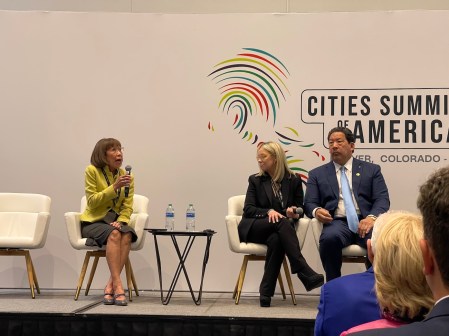Atlanta evaluates dozens of smart city offers

New projects around connected and autonomous vehicles, smart city sensors, fiber and Wi-Fi are expected to launch in Atlanta this year.
The city published four requests for information (RFI) around smart city technology and broadband infrastructure last year and received more than 60 responses by the December deadline. The city is now reviewing those responses, having tested the vendor community waters in preparation of a $250 million infrastructure improvement program called Renew Atlanta, a plan to renew the city’s North Avenue Corridor and resolve an infrastructure repair backlog exceeding $900 million. Analysts say the city’s creative approach to procuring these emerging technologies places it in a leading position nationally in the smart city space.
Under Chief Information Officer Samir Saini and the city’s technology office — Atlanta Information Management — is Torri Martin, director of SmartATL. Martin oversees the recent RFIs, which are oriented around vehicle-to-infrastructure technology, a general smart city funding partnership, city-owned fiber, and Wi-Fi.
“The overarching vision basically is how can we as a city utilize real-time data to improve the decisions that we make that affect our citizens?” Martin said. “So, how do we use the data to improve traffic, public safety, sustainability efforts, city operational services? … I think that’s the overarching vision to make us more resilient. How does this make us smarter? How does this put us ahead of other municipalities when it comes to attracting businesses?”
Projects planned for repairing infrastructure on the city’s North Avenue Corridor include replacing streetlights, repairing and replacing bridges, upgrading traffic signals to reduce congestion, installing bike lanes and making safety and accessibility adjustments as part of what the city calls “complete streets,” building new curbs and sidewalks to accommodate Americans with Disabilities requirements, and upgrading facilities like public spaces, parks and art installations.
“What we’re looking at doing is providing a lot of these new capabilities — from infrastructure upgrades to implementation of various technologies — to work as an ecosystem so we can test out how smart cities work in our environment,” Martin explained. “So that will be deploying cameras to help provide traffic analytics, to providing fiber or some type of communication so we can provide adaptive signal controls to something as simple as turning the streetlights from regular streetlights into LED smart-controlled streetlights, giving our department of public works the capabilities to dim lights on demand.”
Ribbon cutting on the corridor upgrade is scheduled for September. The city is going through the “robust pool” of vendors now, among which are big companies like AT&T and Comcast along with some that are lesser-known, Martin said. The next stage is to create request for proposals (RFPs) informed by the information provided by the vendors.
Martin explained his role as director of SmartATL as a holistic and continuous process of not only technology improvement, but process improvement. Overall, the city is taking a creative approach to smart city technology, said Stuart Cowan, chief scientist at the Smart Cities Council.
Atlanta’s general smart city funding RFI is “very interesting,” Cowan said, because it takes an open-minded and flexible approach to how a partnership with outside entities might work. Some governments establish rigid guidelines that might not make the most of the potential opportunities available, but that’s not what Atlanta is doing, he said.
“It’s essentially looking at public-private partnership models where the city partners with a company or non-profits, a university and the two sides figure out who bears various costs, who provides various resources,” Cowan explained. “The city might be putting up land or various easements or franchise rights. The other partners are putting up more cash or assuming certain kinds of risk. So it’s a general request to say, ‘Hey, what do you want to put up on the table, we can consider it.’ I would say Atlanta is very much ahead of the curve in broadly asking for these potential partnerships.”
The city’s other RFIs, around fiber, Wi-Fi and connected and autonomous vehicles are also solid, Cowan noted. And they’re needed. Atlanta is “truly behind” in the realm of city-owned fiber, Martin reported, and what they have now is not enough to sustain their plans.
“If you don’t control your own fiber, you’re at the mercy of the service providers and their needs are always changing and increasing, as well,” Martin noted.
The city’s fiber RFI delineates a plan to expand its fiber network from about 50 route miles to about 150 route miles. All four of these projects support one another — fiber enables Wi-Fi and Wi-Fi enables connected infrastructure. Fiber is a fundamental ingredient for any city that aspires to be “smart,” said Jesse Berst, chairman of the Smart Cities Council.
“This whole connectivity piece is kind of like the table stakes that lets you play in the 21st century economy,” Berst said. “So if you want to attract jobs, if you want to attract talent, if you want to attract millennials, if you want to attract innovators and entrepreneurs and startups, you’ve got to have ultra-high-speed reliable broadband to all your buildings. You need to be a gigabit city just to be a contender. That’s the first thing.”
The next thing a smart city needs, Berst said, is to ensure that connectivity extends everywhere.
“Long-term, it doesn’t work to only have device connectivity in your downtown,” he said. “You need it in every neighborhood of your city so that you can see the traffic sensors there and pick up the air quality sensors from every neighborhood.”
The city reported there is not yet an official date for RFP releases. The Smart City Council is scheduled to meet with Atlanta officials in March to hold a readiness workshop that will orient the city’s ongoing prioritization and planning process. Ribbon cutting on the corridor upgrade is scheduled for September, and infrastructure upgrades will continue into the coming years.






